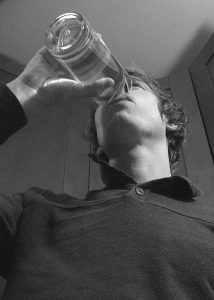Table of Contents
Overview
Hemorrhoids, also commonly referred to as piles, can be uncomfortable, painful, and can even cause a god deal of inconvenience. However, if not severe, we know that the symptoms can be managed with the use of home remedies such as apple cider vinegar and coconut oil. But, if your hemorrhoids have gone too far, the symptoms can also be severe to the extent that they can stop you from being able to live your everyday life.
The majority of the people who have hemorrhoids may not develop any severe symptoms or any serious complications. If managed early, the problem can usually resolve on its own, especially if it has made a significant and appropriate lifestyle change for its betterment. In the long run, it may not have to deal with the problem again. However, if you have continuously brushed off the symptoms and managed to do more bad than good, your hemorrhoids may develop with even worse symptoms as well.
One of the most significant and helpful ways to manage hemorrhoids, which most people do not take seriously, is staying hydrated and reducing or altogether avoiding alcoholic beverages. This article will be dwelling on the relationship between alcohol and vein health, specifically hemorrhoids.
Quick facts on hemorrhoids
Hemorrhoids have always been part of our anatomy, and they will only cause a problem once they get swollen or inflamed. These inflammations will then cause symptoms such as pain and bleeding. They are swollen veins around the lower part of the rectum and anus and are more common in older individuals. Hemorrhoids can be frustrating but can eventually heal and resolve on their own if managed and taken care of. The symptoms can be prevented and managed with home remedies and a better lifestyle. However, for worse conditions, medicine and even surgery might be required.
Alcoholic drinks and hemorrhoids
Too much consumption of alcoholic drinks can significantly affect people’s lives and can even worsen existing underlying conditions. Although not direct, there is still a link and relationship between alcohol intake and alcohol.
Increased alcohol intake can significantly increase blood pressure as well; this means that if you have alcohol in your system, there is an excellent chance that your veins and the circulatory system, in general, can be stressed. With high blood pressure and stressed veins, there is a higher chance of having your veins swollen, resulting in conditions such as hemorrhoids. Hemorrhoids, as mentioned above, are veins around your anus and rectum that are stressed and inflamed, causing pain and even bleeding. In this way, alcohol can contribute to the appearance of hemorrhoids and worsen those that are already there.
Alcohol and healthy veins
Healthy blood vessels, such as the veins around your anus and rectum, will require healthy blood flow and circulation. Increased or excessive alcohol intake will stress healthy veins and the circulatory system in general. Stressed veins can contribute to a greater chance of hemorrhoids, and other problems may occur.
Alcohol and bowel movements
Alcohol intake can also contribute to bowel movement issues, a widespread concern if you have hemorrhoids. Alcoholic beverages are typically diuretic; therefore, they cause dehydration. Dehydration will then cause constipation and will make it extremely difficult to pass out stool. If a person is having difficulties because of constipation, exertion is present, and harder stools can strain your hemorrhoids, causing further irritation and pain.
Liver problems and hemorrhoids
Another significant indirect relationship between alcohol and hemorrhoids is alcohol’s effect on the liver. It is ubiquitous that alcoholic beverages contribute significantly to liver disease and may lead to liver cirrhosis or scarring, impeding the liver functions such as filtering and passing blood. Damage or cirrhosis to the liver can also lead to hemorrhoids. The unhealthy situation of your liver can cause a stressful blood flow, resulting in the need to divert blood. When the body tries to find alternative pathways, it often causes stress on other areas resulting in pressure on the veins in other areas, such as the rectum and anal regions.
What can cause your hemorrhoids to flare up?
Hemorrhoids do flare up, and they can happen at any time and even without warning. These flare-ups can become very intense and out of control, leaving you very irritated, in pain, and uncomfortable. Flare-ups are usually brought out by stress, diet, and constipation, and their severity and duration can vary from one person to another. The most signs to look out for during flare-ups are intense itching, pain and burning sensation around the area, and bleeding. During a flare-up, you can help yourself by soaking the affected area in a warm bath using apple cider vinegar or coconut oil. If you have suppository or topical medicines, you can also use them.
General causes of hemorrhoids
As previously mentioned, hemorrhoids can occur because of increased pressure on the veins in the rectal area. This increased pressure can be brought about by other conditions and will result in swelling due to blood pooling in the veins. If not treated or addressed earlier, these affected veins can cause the surrounding tissue to stretch and swell, leading to hemorrhoids. Other factors that can cause hemorrhoids include chronic constipation, low-fiber diets, pregnancy, obesity, prolonged sitting, pelvic floor dysfunction, severe cough, and even genetics.
Staying hydrated
Drinking enough water and staying hydrated is the cheapest yet very effective hemorrhoid prevention strategy present. When combined with a healthy diet and good fiber-intake, drinking enough water can significantly help you have healthy and smooth bowel movements. Staying hydrated will effectively prevent constipation, therefore decreasing straining. Not only will it help you prevent hemorrhoids, but drinking enough water can also help you keep your digestive system healthy and improve your general health as well.
Final thoughts
It is imperative, and we all know that prevention is always better than cure, and trust us when we say that avoiding hemorrhoids is ten times better than treating them. However, if you already have them, the smartest thing to do is avoid doing things or consuming products that can cause flare-ups or worsen them. Keeping a balanced and healthy diet, avoid straining, taking care of your overall health, and keeping your bowel movements soft, are the best ways to prevent and even manage your hemorrhoids.

